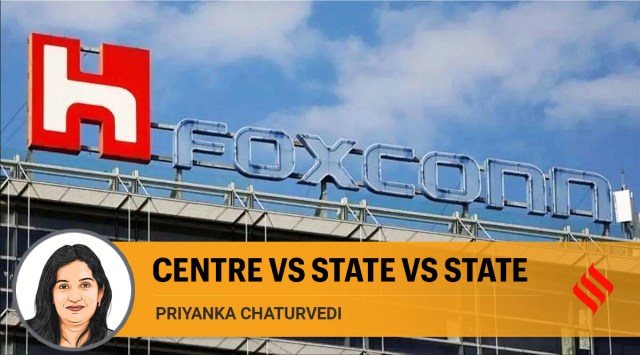
Balasaheb Thackeray’s philosophy towards politics was that of principles – the principles of Jai Hind and Jai Maharashtra, which meant the nation is first, then comes the state. The current political scenario requires the so-called “nationalists” in power at the Centre to re-visit his philosophy more than ever. The recent developments in the Vedanta-Foxconn deal highlight how increasing shallowness and partisanship are overtaking the needs of governance for those who occupy the highest political offices.
In line with Balasaheb’s philosophy of nation first, Aditya Thackeray rightly expressed happiness at the semiconductor facility coming to India — but the question of Maharashtra and its people losing out on development and opportunities despite having offered the best possible incentives cannot be ignored.
It is often said that “once is an accident; twice, a coincidence and three times is a pattern”. There are several accounts of plans and opportunities that were first conceptualised for Maharashtra but ended up going to another state, which seems to have a greater priority for the Centre. This “favouritism” is the harsh truth of Indian federalism today.
The IFSC centre planned in the Bandra-Kurla Complex has been relocated to Gujarat. The National Security Guard & Maritime Policy Academy, initially meant to come to Palghar in Maharashtra was shifted to Dwarka. The ship-breaking facility was moved from Mumbai to Gujarat; the Air India Office from Mumbai to Delhi and so too the Trademark Office – and the list goes on. The Tata-Airbus manufacturing facility could also be lost by Maharashtra thanks to a servile, publicity-hungry chief minister at the helm.
In the case of the Vedanta-Foxconn deal, a comparative study was conducted between Talegaon, Maharashtra and Dholera, Gujarat. Given the various issues around setting up a plant at Dholera — such as lack of water supply, skilled labour, electronic manufacturing ecosystem as well as the absence of supply chain vendors, secondary manufacturers, and the presence of marshy land — it is natural that the decision to set up the facility in Gujarat is attracting a shocked reaction for those aware of the negotiations between the legitimate government (MVA) of Maharashtra and Vedanta.
Maharashtra not only offered a higher capital subsidy of Rs 40,000 Crore, compared to Rs 28,000 crore by Gujarat, but it also offered more land — 1,100 acres compared to 200 acres at Dholera. The shifting of the semiconductor facility to Gujarat, which is neither a major consumer of semiconductors nor has better technical capability compared to Karnataka, Maharashtra, etc — is disappointing.
Why, despite these more lucrative and profitable deals, did the project move to less green pastures? It seems unexplainable — unless the deal has been “Modi-fied”. This phenomenon also explains the sudden increase in FDI in Gujarat – the state jumped from sixth to first position within one year. But coming as this does against the backdrop of upcoming assembly elections in the state, perhaps it shouldn’t be surprising.
The Centre’s step-motherly treatment of opposition-ruled states is not only astonishing but unconstitutional and against the ideals of harmony and unity on which India’s governance structure is based. The Prime Minister of India, who calls himself “Pradhan Sevak”, should remember that he is meant to serve the 138 crore people of India, not just a select few. He seems often to ignore his own words from the Independence Day speech: “Programmes can be different, working style can be different but dreams for the country cannot be different.”
Competitive federalism can be sustained only in an environment where the competition between political equals (states) is fair and transparent. In an ideal scenario, several states contend to attract investments from businesses and try to offer the best possible incentives, letting the businesses freely make their final call. However, this is not how things unfold when political considerations supersede the economic welfare of the nation as a whole for those in power at the Centre.
A BJP Leader from Vidarbha defended the Vedanta-Foxconn move to Gujarat by saying that “everybody knows why the Vedanta-Foxconn has gone to Gujarat. As BJP, we are one. It is Maharashtra’s duty to ensure that BJP wins the Gujarat polls.”
“Maharashtra’s duty”? At the cost of development and employment for its own youth? The political considerations of the current ruling party at the Centre have brought us to this situation – party over country.
This controversy is only a trigger. The more important question is: Who wins and who pays the cost for this kind of party politics? It’s the people of the country who end up losing the most in terms of jobs and development. The Centre’s intervention, arm-twisting and political environment only deter the businesses further from investing in the country due to being embroiled in controversies.
Competitive federalism cannot be a tool for governance in silos. It has to be coupled with cooperation among states and honesty, transparency, and bipartisanship from the Centre. It also cannot disregard the aspect of asymmetric federalism – different states have different needs and the Centre is bound to ensure the development of each unit.
Cooperative and competitive federalism may be two sides of the same coin competition alone cannot give the best results. It is competition with cooperation (horizontally as well as vertically) that will drive real change.
(The writer is a Shiv Sena leader and Rajya Sabha MP)
This article first appeared in the print edition on September 19, 2022, under the title, ‘Centre vs State vs State’